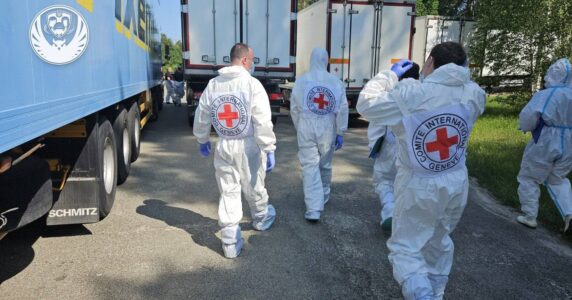Navigation and useful materials
The first package of international sanctions for encroachment on Ukraine’s sovereignty was imposed on Russia back in March 2014, following the pseudo-referendum in Crimea and Sevastopol. The subsequent armed aggression, occupation of the Donbas and full-scale invasion of Ukraine were met with new waves of sanctions.
Financial and other restrictions on the Russian Federation were imposed by the European Union and all European states (except for Serbia and Bosnia and Herzegovina), the USA, Canada, Australia, New Zealand, Japan and a number of international organizations. This also led some countries that did not join the sanctions to curtail cooperation with Russia in a number of industries. In particular, India, the Philippines, and Indonesia have postponed or suspended military contracts; Israel stopped supplying the Russian Federation with drones; lending to Russian businesses in Chinese and Israeli banks became significantly more difficult. Perhaps the biggest slap in the face for Putin personally was the return of the “Big Eight” to the “Big Seven” format by excluding Russia from this elite club.
The Kremlin responded to the increased sanctions with its own counter-sanctions, a large part of which had mainly a media effect rather than an economic one, as well as an information campaign aimed at discrediting anti-Russian measures.
Since 2014, the Kremlin has been systematically promoting anti-sanctions narratives aimed at both domestic and foreign audiences. The messages may contradict each other, but they all serve the same purpose: to convince the world that sanctions should be lifted immediately or at least eased.
Key narratives include:
- Sanctions benefit Russia, promote import substitution, activation of domestic production, reorientation of the economy from the West to the East;
- Sanctions hurt the West more than Russia;
- Dissatisfaction with sanctions is growing in the West (primarily in the EU), Western governments and companies are interested in cooperation with Russia and find opportunities to circumvent sanctions;
- Sanctions are unfair and affect regular innocent people;
- Sanctions destroy non-political spheres of international cooperation: space exploration, sports, culture, etc.;
- Sanctions are a manifestation of Russophobia, a departure from Western principles of tolerance, human rights, and freedom of speech;
- Sanctions have reached their maximum, and it is impossible to increase pressure any further;
- Sanctions are ineffective; they have not achieved their goal;
- Sanctions destroy the unity of the West and the unity of the European Union in particular;
- EU imposes sanctions under US pressure.
Here is a detailed description of how propaganda works in Europe: Kremlin’s Anti-Sanction Narratives: What Russian Propaganda in Europe Says
With the beginning of the full-scale invasion of Ukraine, the following statements emerged on the list of Russian narratives:
- Sanctions provoke a global food crisis;
- Sanctions provoke the decline of the Euro;
- sanctions lead to the energy collapse of Europe and the failure of the heating season.
Officials and institutions, including the head of the Kremlin, numerous Western “friends of Putin,” as well as all the media resources available to Russians are involved in the promotion of an agenda beneficial to Russia.
Among the speakers promoting anti-sanctions narratives, the following groups can be distinguished:
- Representatives of Russian authorities and their spokespersons (Presidential Administration, Ministry of Foreign Affairs, Ministry of Finance, Ministry of Economic Development, Central Bank, members of the State Duma, members of the Federation Council);
- “Putin’s friends” among European politicians (Marine Le Pen, Silvio Berlusconi, Matteo Salvini, Nigel Farage, Viktor Orbán, Aleksandar Vucic, Igor Dodon, Bulgarian Social Democrats, Alternative for Germany, Podemos, far-left and far-right parties);
- Political commentators and observers (Graham Fuller, Jens Jørgen Nielsen, Jim Jatras, Jan Oberg);
- Belarusian dictator Alexander Lukashenko and heads of quasi-state entities controlled by the Kremlin (Aslan Bzhaniya, Anatoliy Bibilov).
Russian propaganda also occasionally uses the statements of politicians and international organizations that support sanctions by taking individual phrases out of context and accompanying them with their own commentary to promote anti-sanctions narratives.
See also: How Russia is lying about the “benefits” from “illegal” sanctions yet keeps fighting against them
Russia’s MFA responds to every new set of American or British sanctions with promises of “an effective and harsh response.” After sanctions are introduced or extended by EU countries, Lavrov’s agency claims that “the EU is driving itself into a corner.” Members of the State Duma and the former president of Russia, who has now been entrusted with the position of deputy chairman of the Security Council, allow themselves much harsher rhetoric about EU “shooting itself in the foot” or even sanctions as an “act of international aggression.”
Western speakers are mostly responsible for promotion of narratives “sanctions harm the EU more than Russia” and “sanctions do not achieve their goal.” For instance, leader of the French “National Assembly” party Marine Le Pen said on BFM TV on July 10 that “ineffective sanctions have only enriched Russia.”
In less than two weeks, The Guardian columnist Simon Jenkins published an op-ed entitled with the same statement: “The rouble is soaring and Putin is stronger than ever – our sanctions have backfired.”
Do Western sanctions really benefit the Russian economy? Everything we need to know is in the numbers.
What is happening to Russian industry?
- During February-June 2022, 113 thousand enterprises closed in Russia. This is 17% more than in the same period of the previous year, when business suffered from quarantine restrictions;
- According to the estimates of Yale University researchers, over 1000 foreign companies have pulled out of the Russian market or announced the intention to do so since February. Their investments in the Russian economy exceeded 600 billion dollars, and they provided about 5 million jobs.
During the first five months of the full-scale war in Ukraine, the production of cars in Russia decreased by 33 times, buses — by five times. Here is what remains of production in key industries (indicators compared to last year):
- Household washing machines — 40.8%
- Refrigerators — 41.9%
- Freight cars — 48.2%
- Electric motors — 50.1%
- Elevators — 65.3%
– Transportation of forest cargo in annual terms dropped by 17.8%, transportation of grain by 14.1%.
What is happening to Russian finances?
The Kremlin is running out of money, and Russians are taking their savings abroad en masse, thus withdrawing them from the national economy. State currency reserves are spent at an accelerated rate:
- 300 out of 600 billion international reserves of the Russian Federation are blocked abroad;
- $75 billion has been spent since the start of the full-scale aggression;
- Russian Minister of Finance Anton Siluanov initiated covering the budget deficit at the expense of the National Welfare Fund, which is the name of Russia’s reserve fund.
The increase in demand for real estate in the Middle East, in particular in the United Arab Emirates, indicates the withdrawal of foreign currency savings of individuals. Real estate agents in Dubai report doubling or even tripling revenue from deals with Russians.
Mass migration and sanctions against the Russian banking sector led to Russians’ funds being transferred to accounts in the countries of Transcaucasia and Central Asia:
- in May, Armenia set an all-time record: $266 million came from the Russian Federation (against $115 million in March).
- the amount of transfers from Russia to Georgia increased from $27 million in March to $313 million in May. In June, the volume of transfers amounted to $231 million;
- Russians deposited $9.5 million in Kazakhstan bank accounts in March, and in May — 10 times more (94.6 million);
- Banks of Uzbekistan received about 200 million dollars from clients from the Russian Federation during the first half of the year.
Sanctions also delivered a harsh blow to the Russian financial market. BlackRock, the world’s largest investment company, has announced the closure of the Russia ETF stock exchange fund. Liquidation of the fund will begin on August 17. On February 28, the value of Russian assets, which were estimated at $18.2 billion a month before, fell to $1 billion. In March, the company stopped issuing Russia ETF shares.
Did import substitution work?
Import substitution Russian style does not work. It turned out that in many areas of production, Russia’s dependence on exported products is critical, and in over eight years, this dependence has not been overcome. Before the full-scale invasion, import supply in key Russian industrial sectors provided for 30-70% of added value or output. The largest share was in the production of computers and electronics, machines and equipment, vehicles. In the chemical industry, about 40% of added value was provided by import purchases, in the food industry the figure was about 30%.
A survey conducted by the Russian Central Bank in July revealed that 40% of pharmaceutical companies could not find a substitute for imported raw materials, components, and equipment. Only 10% of the industry’s producers confirmed that they are not dependent on imports.
As of 2021, the share of domestically produced medicinal products on the Russian market was 38.5%. Only 35 out of 162 strategically important medicines were produced in Russia, despite the fact that the import substitution program in the pharmaceutical industry was launched back in 2009.
Due to the sanctions, Russian doctors and their patients have already faced a shortage of needles, gloves, filling material, HIV tests, consumables for endodontics, etc. Russian confectioners are faced with a shortage of emulsifiers and food colouring.
The Russian telecommunications giants MTS, Beeline, Megafon and Tele2, or rather their clients, also felt the “efficiency” of import substitution: sanctions and the withdrawal of equipment suppliers from Russia have negatively affected the quality of the Internet.
Due to the lack of access to imported parts and high-tech products, Russian car manufacturers achieved the abolishment of modern vehicle safety standards.
The termination of high-tech imports also means limited ability to repair and maintain aeroplanes, produce tanks and other military equipment. The Pentagon believes that the sanctions have significantly reduced Russia’s military offensive potential.
Roscosmos has only five satellites for round-the-clock operational monitoring of flood and fire threats. In the modern Russian satellites for remote probing of the Earth, the share of imported components reaches 80%. The components necessary for the Russian Federation are produced by China, but under a US licence without the right to transfer them to third countries. Given China’s large space program, Beijing is unlikely to risk it all by helping the Kremlin.
Will Russia’s gas blackmail work?
The Kremlin is trying to get as much as it can out of the dependence of Europe’s, particularly Germany’s, industry on the Russian energy resources. Very public gas blackmail and wild price swings did their job back in the day in the “gas wars” against Ukraine, and now, they are trying to do the same trick with the EU.
But it is worth noting that Russia sold 83% of its energy resources to Europe, and it is losing much more due to sanctions than Europeans are. Putin needs the European market much more than the world needs Russian energy resources.
Almost 60% of Russian budget revenues depend on the sale of energy resources. The supply of Russian gas to Europe has fallen to record low values, and the reorientation to the East announced by the Kremlin is not yet possible due to the lack of infrastructure. One after another, European politicians declare their intention to significantly reduce the consumption of Russian gas in a short period of time. In addition, a ban on the import of Russian coal and oil comes into effect in August.
According to estimates of experts surveyed by Bloomberg in May, this year, Russia will lose 9% to 17% of oil production, 6% to 8% of gas production, more than 19% of investment. Living standard will drop by 6.8%; in terms of real incomes, it will be the biggest drop since the default of 1998.
Experts expect a two-year recession (the first one since the mid-1990s) that will nullify more than 10 years of Russia’s economic growth by 2024. According to the consensus forecast, Russia’s GDP will fall by 10% this year (a record since 1994).
During the first five months of the full-scale invasion of Ukraine, almost 4 million people left the territory of Russia. These figures are provided by the official statistics of the Federal Migration Service.
The British consulting company Henley & Partners predicts that 15 thousand millionaires and their families will leave Russia by the end of the year. The emigration of entrepreneurs will deal a blow to the Russian economy commensurate with the sanctions.
Thus, the sanctions are working. The crisis of the international security system provoked by the Kremlin also causes losses to the West, but Russia is losing much more. Attempts by a country that generates only 2% of the world’s GDP to dictate terms to the community that generates more than 50% were doomed from the start.
Russia faces the prospect of a relentless reduction in industrial production, an increase in unemployment, a drop in income and consumption, a decline in business activity, and increased international isolation.
At the beginning of July, the head of European diplomacy, Josep Borrell, said that Moscow would have to “choose either butter or guns.” The Kremlin’s master clearly made this choice before: his maniacal desire to destroy Ukraine proved to be more important to him than the well-being of his own people. Putin’s whim affected everyone: ordinary citizens, businessmen/oligarchs, and even Russian officials.
If you have found a spelling error, please, notify us by selecting that text and pressing Ctrl+Enter.


